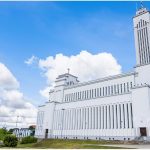Bangladesh Power Change Part II
4: Soil and water give power
In the 1970s, living standards and positions of power largely depended on how much land one owned. Shamsul Huq was the village’s largest landowner, a position he consolidated through constantly new acquisitions . He rented out parts of the land for a fixed term (right of use in exchange for paying annual rent).
Many dozens of poor farmers, who were either landless or owned little land, got day and seasonal work at Shamsul Huq. There was high unemployment in the village, and those who got jobs became his supporters in the village. He was also a lender of money to neighbors and people in need. At the same time, this meant that he took high interest rates and made sure to take the land to the borrowers as collateral. If they did not manage the installments, he could thus take over land properties at a favorable price.
FERTILIZER: Shamsul Huq himself is proud of what he has achieved in Bhaimara. During my last visit, he took me up on the village’s only small ridge by his house and pointed out: – Look, what I have done for this village. I am the one who has provided good roads, electricity, wells and new technology in agriculture, he says.
With its connections – both centrally and locally – Shamsul Huq managed to obtain subsidized fertilizers and herbicides for agriculture. – What I have not needed myself, I have passed on to relatives and friends in the village, he says.
“WATERLORD” : Shamsul Huq had good contacts in ministries in Dhaka and in administrative bodies at the local level. Through these he managed to channel much of the aid so that he got benefits from it . The paved main road in the village thus goes just past his hometown with a beautifully built side road up to his own house. The village’s first well came in 1977. It could irrigate 100 acres of land and was placed on one of his plots of land . Shamsul Huq thus became not only the village’s great ” landlord “, he also became the village’s ” waterlord”». In addition to irrigating his own plots of land, he could now simultaneously sell water to farmers with land in the same area. In this way, he was able to further expand his business base.
The village’s largest and deepest pond, which is very useful during the dry season, is located next to the home of Shamsul Huq. It is built by poor women and men with support from international aid, a so-called “food for work” project in Bangladesh, a country located in Asia according to lawschoolsinusa.com.
5: Managed state money
Shamsul Huq has for many years been, and still is, the chair of the school committee, a position that has given power over the distribution of state scholarships to selected students in the village. Similarly, he has also had an influence on the distribution of old-age pensions.
Because he was so central to the distribution of vital resources, Shamsul Huq was formerly a vulnerable person. He had enemies in both the village and the neighboring villages. – Many do not like that I have succeeded so well, he says.
PISTOL IN THE POCKET: In the 1970s, he never moved around alone and always carried a pistol in his pocket. The “cheese power” reaches Shamsul Huq and his entourage stranded through the villages.
From time to time, representatives from donor organizations visited the village. People from the state Norwegian aid agency Norad were also in the village on several occasions. Then the strong man of the village was always in place to show the visitors around.
As a bureaucrat , Shamsul Huq mastered the language of development in the development community and met the donors at home. He spoke easily on behalf of the poor and could describe their needs as he saw them. The visits from Dhaka did not always lead to new projects. In any case, he was able to show the villagers who had contacts with powerful people with money from outside.
HALF AWAY: Those in the village who first benefited from the aid through the authorities were those who were part of Shamsul Huq’s large network . But on the way there, from the central authorities and down to the local level, there were many public employees who “ate off the load”. The contractors who were to build the road or the school also paid extra well.
“As a rule, only half of the money that has been allocated from the central level, which reaches Bhaimara and is used for the planned agricultural and infrastructure projects in the village,” says Shamsul Huq.
6: Changed balance of power
So someone has eaten off the load. But all in all, aid has nevertheless contributed greatly to tipping the balance of power in favor of ordinary people. This must be the conclusion as of 2011. Two important local development actors, supported by Norway and others, have been key – Grameen Bank and the non-governmental organization BRAC . In the 1980s and 1990s, they began lending money to poor people in the village. It has greatly contributed to reducing the dependence of the poor on the rich.













